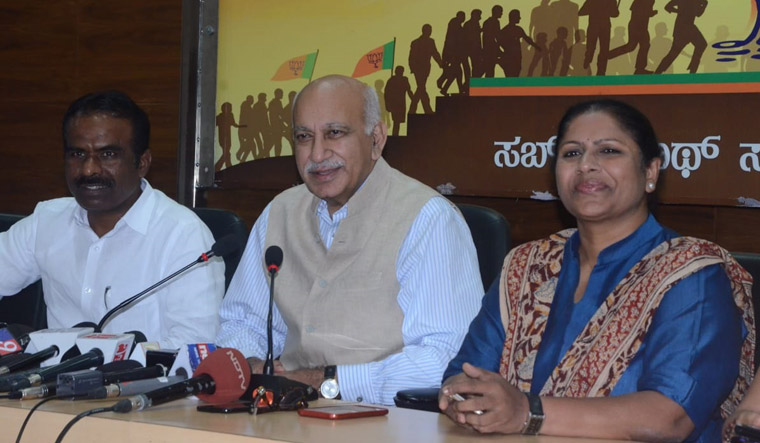“Emergency was the Jallianwala Bagh of free India. In fact, the term 'Emergency' does not do justice the events that took place 42 years back,” said Union Minister of State for External Affairs M.J. Akbar in Bengaluru on Tuesday.
“The phrase 'Emergency was declared' does not do justice to what happened. In 1947, at the midnight hour, India got freedom, and in 1975, at the midnight hour, that freedom was destroyed. At that moment, political activists were arrested and jails meant for criminals were converted into homes of leaders, of people whose only sin was to ask for what was their birth right—freedom. As we discuss, our search for metaphors continues. For me, Emergency was the Jallianwala Bagh of free India,” said the minister, who was in town to deliver a keynote address at an event to mark 42 years of Emergency.
The younger generation will find it difficult to comprehend the period of Emergency as the reality might seem a little beyond belief, Akbar said, adding that to ensure that Emergency is never repeated in this country, one has to ensure that it is remembered. “Vigilance is the price we must pay to safeguard liberty. Vigilance means remembrance and we cannot afford to forget those dark and dangerous 19 months. Even those who were not born in 1975-76 should remember it as it was a blot on our history.”
He said, “All that Indians wanted in June 1975 was freedom and all they got was massacre of democracy. For 19 months, Indians lived in complete fear, which the young today cannot even comprehend. We lived in the silence of censorship. We lived at a time when authoritarianism and dictatorship was imposed on people. When government policies took as brutal a shape as forced birth control and sterilisation, when newspapers did show the courage to print blank space where stories had been censored, when there was no television in the country apart from a sycophantic Doordarshan. There was no social media. Today, free speech in India is a treasure house in its vitality and range, where every mobile phone has become a media vehicle. That's a good thing.”
Citing the reason for the Emergency, Akbar said, “The atrocity upon the nation was nothing more than the desire of one lady, Mrs. Indira Gandhi, to avoid or evade the consequences of a decision made by the Allahabad High Court after due process....When the judgement came, instead of honouring the law and judgement, the prime minister of India rose above and decided she was above the law.”
The minister stated it was no accident but Mrs. Gandhi's “dictatorship” that was responsible for Indians losing their right to speech and liberty and even their right to life. “The attorney generals of India argued before the Supreme Court that if the government so willed, it would take the life of a citizen. That was the type of dictatorship that prevailed. Emergency could not crush the spirit of the Indian people, which seized the opportunity and became a volcano. Mrs. Gandhi's decided to hold elections in 1977, as her advisers perhaps miscalculated the situation. She could not imagine the anger that lay below and it proved to be a crucial milestone in Indian democracy as the Congress was defeated.”
Akbar alleged that the 'dynasty' was nurtured behind the curtain of Emergency. “Emergency became the curtain behind a number of tendencies found their way into governance and the system. Even the ruling Congress party was not fully aware of what was happening. The authoritarian behaviour that was building up and had reached an apex actually returned in 1980 when Mrs. Gandhi was reelected. It is these tendencies which made the government behave in a certain way in many sensitive states like Punjab, Assam, and Andhra. In Punjab, the situation went out of control and the nation paid a big price. Emergency and the draconian governance are both anathema to democracy. The fact that the country was imprisoned, every vestige of freedom was sacrificed for one dynastic power centre, make it important for us to remember and recall the Emergency,” added Akbar.
On Congress leader Saifuddin Soz's controversial statement that former home minister Sardar Vallabhbhai Patel wanted to give away Kashmir to Pakistan, Akbar said, “There is serious history deficiency in the IQ of Congress leaders. Why don't we collect some fund and buy them some good books? Soz is trying to reinvent history in the service of his party and such statements provide further evidence that the Congress party is simply not responsible enough to be anywhere near power.”


